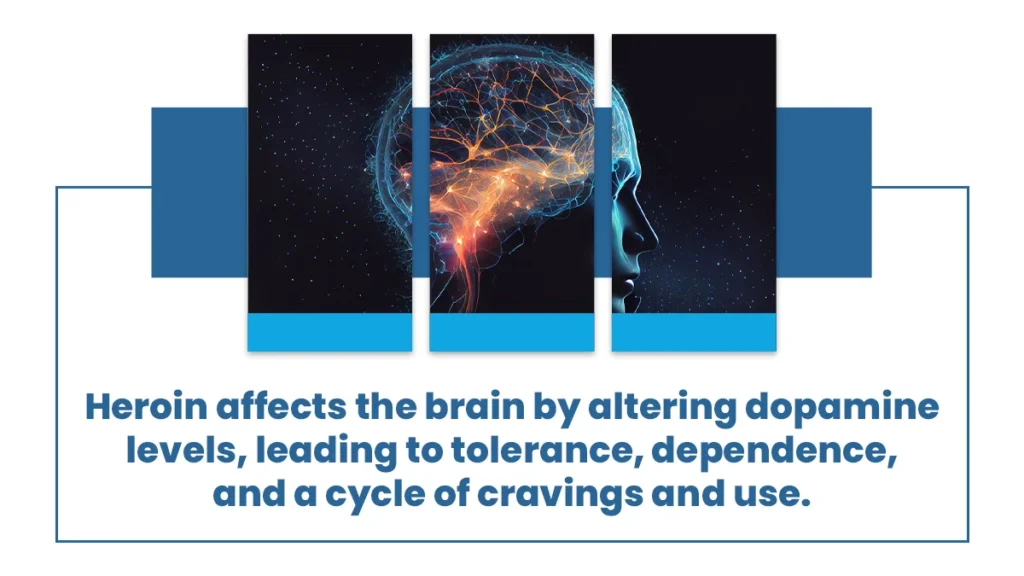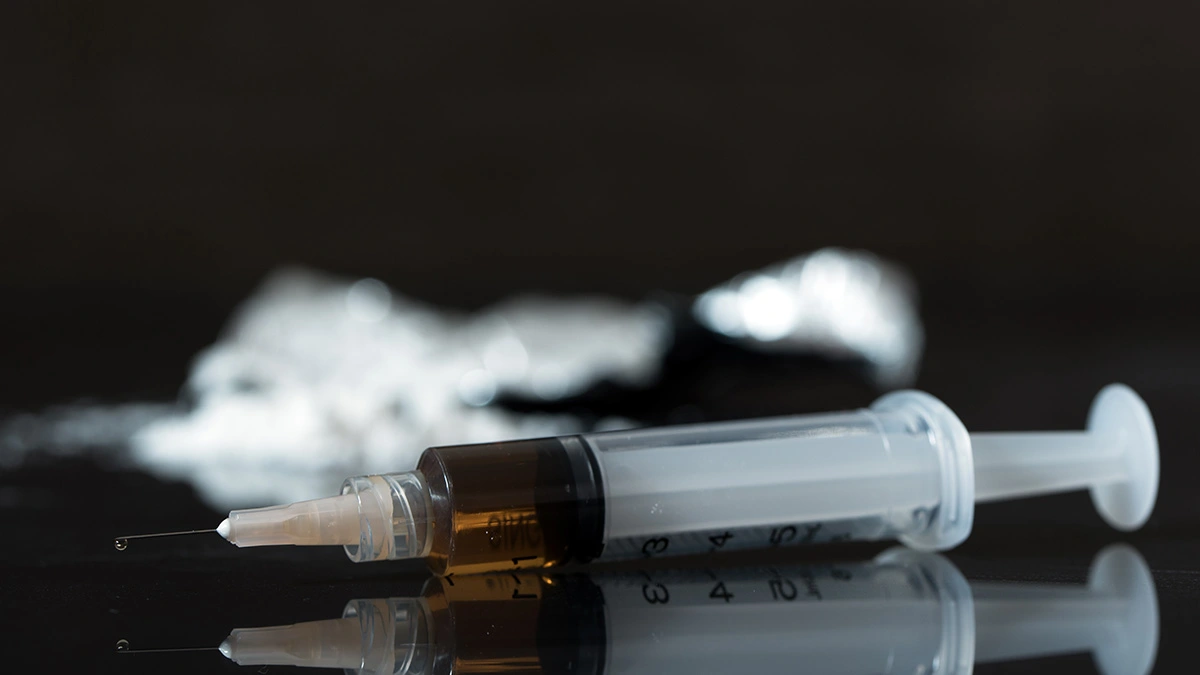Heroin, a highly addictive opioid drug, poses a higher risk for addiction due to its powerful impact on the brain. It swiftly creates tolerance, compelling those who take it to increase their dosage to experience the same high, leading to dependence and addiction.
Continue reading as we examine the details of why heroin is so addictive, shedding light on its chemical impact on the brain and body. In addition, we’ll also explore treatment options available for individuals struggling with heroin addiction, offering hope and guidance for recovery.
Key Takeaways
Heroin is a highly addictive drug that impacts the brain and life of those who use it, but recovery and support are available. Here is what you need to know:
- Heroin’s history dates back to the late 19th century when it was marketed as a non-addictive painkiller.
- Heroin affects the brain by altering dopamine levels, leading to tolerance, dependence, and a cycle of cravings and use.
- Heroin’s potent addictive qualities stem from the traps of tolerance, dependence, and the relentless cycle of withdrawal and relapse.
- Effective treatment for heroin addiction involves detox, therapy, counseling, and MAT to help individuals recover.
- Despite the challenges, recovery from addiction is achievable with support, healthy coping strategies, and persistence.
The Haven Detox-New England offers a range of services to help individuals overcome heroin addiction. Call us at (844) 933-4145 for more information.
Journey through Time: A Brief History of Heroin
Heroin, initially synthesized in the late 19th century, was developed from morphine, a substance derived from opium poppies. It was originally marketed as a less addictive substitute for morphine and was used as a cough suppressant and chronic pain reliever. However, it soon became apparent that heroin was highly addictive, causing widespread misuse and addiction issues.
By the early 20th century, its addictive nature was evident, leading to strict regulations. Despite this, heroin abuse continued, especially in the 1960s and 1970s, contributing to a public health crisis in the United States. Today, heroin remains a controlled and illegal substance due to its severe addictive properties and detrimental impact on individuals and communities.
From Pleasure to Addiction: The Science Behind Heroin

Heroin addiction is a complex issue, deeply rooted in the way this powerful opioid affects the brain and, more specifically, how it manipulates the brain’s reward system. Understanding the science behind heroin addiction can shed light on why it’s so challenging to overcome.
How Heroin Affects the Brain
When heroin enters the body, it quickly passes the blood-brain barrier and is converted into morphine. Morphine then binds to specific receptors in the brain, known as opioid receptors. These receptors are located in areas responsible for controlling pain and emotions. Heroin use induces a flood of dopamine, a neurotransmitter associated with pleasure, throughout the brain. This surge creates an intense euphoria, which is a key factor contributing to heroin’s addictive nature.
Role of Dopamine in Heroin Addiction
Dopamine plays a central role in heroin addiction. The human brain becomes dependent on the drug to release dopamine and experience pleasure, which leads to a decrease in natural dopamine production. Over time, heroin users find it increasingly challenging to feel pleasure without the drug. This compels them to continue using it to avoid withdrawal symptoms and emotional distress. As a result, a vicious cycle of addiction is established.
Why Heroin Hooks: Understanding Its Addictiveness
Heroin’s addictive nature lies in its ability to create a relentless cycle of tolerance, dependence, and withdrawal, making it exceedingly challenging for individuals to break free from its grasp. This cycle perpetuates the addiction, pushing those individuals into a persistent struggle with the drug.
Trap of Tolerance and Dependence
One of the key reasons heroin is profoundly addictive is the rapid development of tolerance and physical dependence. Tolerance means that over time, the body becomes less responsive to the same amount of the drug, requiring higher doses to achieve the desired effect. This prompts individuals to increase their heroin intake, which, in turn, intensifies the risk of heroin overdose and adverse long-term effects.
Simultaneously, physical dependence develops as the body becomes reliant on heroin to function normally. When a dependent individual attempts to quit, they experience a range of distressing withdrawal symptoms, including nausea, muscle pain, and intense cravings. These symptoms often drive individuals back to the use of heroin in a desperate effort to find relief.
Cycle of Withdrawal and Relapse
The cycle of withdrawal and relapse further cements heroin addiction. Heroin withdrawal is a painful experience that can last for days. The fear of these severe symptoms often discourages individuals from attempting to quit, leading to repeated cycles of drug use, withdrawal, and relapse.
Additionally, the intense cravings and discomfort associated with withdrawal make it exceptionally challenging for individuals to maintain abstinence. This cycle reinforces the association between heroin and relief from suffering, making it incredibly difficult to break free from drug addiction.
Overcoming Heroin Addiction: Treatment Strategies
Effective treatment for heroin addiction is available, offering hope for those seeking recovery. The journey to overcome this challenging addiction typically involves a combination of strategies, including:
Detox and Withdrawal Management
The first step in treating heroin use disorder is detoxification. During this phase, individuals stop using heroin, and their bodies begin the process of expelling the drug. Detox can be challenging, as withdrawal symptoms emerge, and they can be extremely uncomfortable. These symptoms may include nausea, muscle pain, increased heart rate, anxiety, and intense cravings for the drug.
Detox is safest when effectively conducted under medical supervision, typically in an inpatient setting. Medical professionals can administer prescription drugs to alleviate withdrawal symptoms, making the process more manageable and reducing the risk of relapse. The detox duration varies from person to person but typically lasts a few days to a week.
Therapy and Counseling
After detox, therapy and counseling play a vital role in helping individuals address the underlying issues contributing to their drug abuse. Behavioral therapies, such as cognitive-behavioral therapy (CBT) and contingency management (CM), are commonly used. These therapies help individuals develop strategies to cope with cravings, identify triggers for drug use, and build healthier life skills.
Individual and group counseling provides a supportive environment where individuals can share their experiences, gain insights from others, and receive guidance from medical experts. Therapy and counseling are essential for helping individuals develop the skills and resilience needed to maintain sobriety over the long term.
Medication-Assisted Treatment (MAT)
Medication-assisted treatment (MAT) can be a valuable component of heroin addiction treatment. MAT involves the use of medicines, such as methadone, buprenorphine, and naltrexone, to reduce cravings and withdrawal symptoms. These medications work by targeting the same brain receptors as heroin but in a safer and less euphoria-inducing way.
MAT can be an effective long-term treatment option, as it helps stabilize individuals in recovery, lessen the risk of relapse, and improve overall well-being. The choice of prescription medication and treatment plan is tailored to each individual’s unique needs.
Embracing Hope: Recovery is Possible
Recovery from heroin addiction is a challenging journey, but it is a path that countless individuals have successfully traversed. With the right support and determination, overcoming addiction and building a healthier, drug-free life is entirely possible.
Seeking Help and Support
One of the first steps to addiction recovery is seeking help and support. This can come in the form of reaching out to a doctor, addiction specialist, or a support group. Recognizing the need for assistance is a significant leap toward a healthier, addiction-free life.
Personalized Treatment Plans
Effective recovery often involves personalized addiction treatment plans. No two individuals are the same, and their journey to recovery may require unique approaches. Tailoring the approach to an individual’s specific needs increases the likelihood of a successful recovery.
Building a Support System
Recovery is not a solitary journey. Building a strong support system is crucial. This can include family members, friends, or support groups where individuals can connect with others who have faced similar challenges. A supportive network provides encouragement, understanding, and accountability.
Healthy Lifestyle Choices
Embracing a healthier lifestyle is an integral part of the recovery process. Engaging in physical activities, maintaining a balanced diet, and practicing stress-reduction techniques can significantly contribute to well-being and help prevent relapse.
Taking It One Day at a Time
Recovery is a journey, and it’s important to remember that setbacks can happen. Relapse doesn’t mean failure but rather an opportunity to learn and progress. It’s essential to stay committed to your recovery goals, practice self-compassion, and surround yourself with a supportive network.
Recovery from heroin addiction is a challenging but entirely achievable endeavor. It requires dedication, resilience, and the willingness to seek help. These steps allow you to find a healthier, drug-free life.
Frequently Asked Questions (FAQ)
What is it really like to be addicted to heroin?
Being addicted to heroin is like being trapped in a never-ending nightmare. It’s a relentless craving, a constant battle. Heroin becomes your only escape, but it takes away everything you once held dear. Life spirals out of control, and every day is a struggle.
Which is more addictive? Alcohol? Or heroin?
Heroin is generally considered more addictive than alcohol. While both can lead to substance use disorder (SUD), the rapid and intense effects of heroin on the brain make it highly addictive, often causing dependence after just a few uses. Alcohol addiction tends to develop more gradually, affecting people differently.
How long does it take to get physically addicted to heroin?
Becoming physically addicted to heroin can happen quickly. In as little as a few days or weeks of regular use, the body can develop a physical dependence, leading to withdrawal symptoms when not using the drug. It’s a fast and dangerous process.
Find Renewed Hope at The Haven Detox-New England
Are you or someone you know grappling with the harrowing grip of heroin addiction? It’s crucial to understand the gravity of the situation, but more importantly, to realize that recovery is possible. The Haven Detox-New England is here to guide you on your journey to a brighter future.
Our comprehensive services start with medical detox, clearing your body of harmful toxins, followed by round-the-clock care in our residential rehab program. If you’re battling mental health problems alongside heroin addiction, our dual diagnosis program can support you.
Your journey to a happier, addiction-free life begins with a call to us at (844) 933-4145. Don’t wait. Take the first step toward recovery and rediscover the joy and freedom that life has to offer.
Verify Insurance
Let’s get you or a loved one help with a few simple steps.
-
Heroin Treatment
- Beyond Pleasure: The Addictive Nature of Heroin
- Exploring the Long-Term Effects of Heroin
- Heroin and Its Effects on the Body
- Heroin Withdrawal Timeline and Coping Strategies
- How to Detect a Heroin Overdose
- Identifying Symptoms of a Heroin Addiction
- Signs That Point to Heroin Use
- What Does Heroin Do? Understanding the Impact




